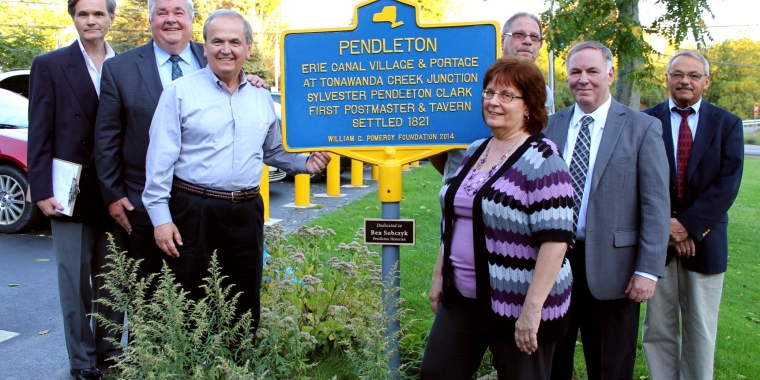Joint statement from Senator Maziarz and IBEW Local 97 President Ted Skerpon on transmission system upgrades
George D. Maziarz
February 20, 2014
-
ISSUE:
- Energy
- Electricity
- Telecommunications
-
COMMITTEE:
- Energy and Telecommunications
Starting with the New York State Transmission and Reliability Study (STARS) that identified significant bottlenecks in our transmission infrastructure back in 2010, policymakers and the public alike have become very aware of the significant and persistent problems that an aging and inefficient transmission system has created. Make no mistake—these negative consequences affect each and every New Yorker.
In 2012, the Energy Highway Initiative was announced in order to address these issues, and last year the Public Service Commission acted decisively to reduce the number of bidders to just four. One of the key elements of the Energy Highway blueprint was that any project chosen must be able to effectuate the transfer of 1,000 Megawatts of energy from upstate New York to New York City.
More recently though, the Commission’s actions in this important proceeding have been both puzzling and troubling. This began with the issuance of a notice by the Commission on January 17, 2014 that appeared to signal an abrupt change in direction that would either delay or worse-still stop this proceeding dead in its tracks.
With that notice, we began to reach out to organizations and individuals who agreed with us about the urgent need for these upgrades and encouraged them to reach out to the Commission. An impressive number of individuals and groups did so (see list below). These groups represent a cross section of the entire state, and their comments clearly demonstrate the positive impacts of these projects that would create more than 10,000 jobs and lower energy rates statewide by $650,000,000.
We believe these efforts on our part lead to some of the positive statements from Chairwoman Zibelman at today’s PSC Session that indicate that this AC transmission proceeding is in fact not stopping but is moving forward. Commissioner Burman rightly pointed out that the Administrative Law Judges in this case should look to expedite and continue their work with an eye toward bringing the process to a conclusion and choosing a developer, as well as dealing with questions of appropriate cost recovery. In fact both Chairwoman Zibelman and Commissioner Burman indicated that real competitive transmission development is a priority. These are positive steps, and we appreciate them.
However, the Commission also chose to establish another proceeding that would allow for a streamlined siting process as mentioned in the State of the State Address and also allow projects of under 1,000 megawatts to be considered. Having a streamlined process can be a good thing if the parameters are reasonable, consistent, and not done on an ad hoc, piecemeal basis. Commissioner Burman today also recognized no legislative impediment exists to fast tracking transmission upgrades and what is done in that future proceeding needs to ensure it does not negatively impact the ongoing AC transmission proceeding.
The decision to consider projects under 1,000 megawatts is a mistake. This change in rules deep into the process may discourage developers from continuing to invest money, confuse local landowners who are concerned about their property rights and ultimately undermine the important goal of allowing for the transfer of 1,000 megawatts of upstate power to New York City. This would lead to higher utility rates, decimate jobs in the upstate generating industry and decrease the availability of jobs for working men and women.
Therefore, while we were encouraged that the AC transmission proceeding is clearly not halted as others had suggested, we need to continue to monitor both proceedings and hold the Commission accountable for its actions. The Commission has an obligation under law to make decisions in the public interest and to ensure the delivery of safe and reliable electric service. Therefore, we respectfully urge them to press ahead with Energy Highway Blueprint 1000 MW minimum transmission priorities and expedite this work as outlined in the Governor’s 2014 State of the State Address. The Commission must move this process forward, pick a single developer, determine proper cost allocation, and bring this process to a conclusion, while working to reduce impacts on private property owners. In short the Commission must be able to manage more than one thing at a time, and we will be watching to see that they do.
#####
Parties that have weighed in on these proceedings in favor of transmission upgrades
Labor Unions Across the State
Joint Senate letter from Sens. Maziarz, Parker, O'Mara, and Ritchie
Unshackle Upstate
Buffalo Niagara Partnership
Generator Consortium
Energy Coalition (NY Transco)
Somerset Power Plant
Town of Somerset Supervisor
Barker School District
Town of Tonawanda (re: Huntley)
Share this Article or Press Release
Newsroom
Go to NewsroomNew historic marker recognizes Pendleton history
September 29, 2014

Tax relief coming this fall
September 17, 2014
Senator Maziarz meets with Lewiston seniors
August 19, 2014